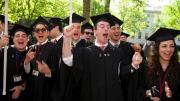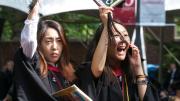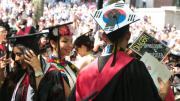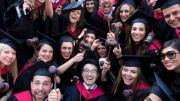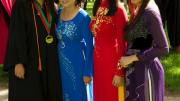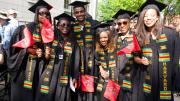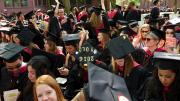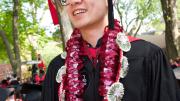Greater Boston had a cream-puff of a winter—particularly in comparison to the relentless battering of 2014-2015, when icicles by the ton made it hazardous to walk near many of the Yard’s buildings. But the spring was very poky: it snowed on April 3 and 4, and many a morning was in the 30s, even in May. As a result, the blossoms of lilacs, dogwoods, and azaleas hung around (and were joined by a secondary chorus of viburnums, fringetrees, and rhododendrons), prettifying the campus for generation-spanning reunioners and arriving soon-to-be graduates’ families and loved ones—all converging on the 365th Commencement.
So it was of a piece with the volatile meteorology that the thundery showers of a misty, gray, mid-50s Tuesday and Wednesday morning’s residual murk gave way, like that, to summery temperatures in the mid 80s for the Wednesday oratory, and again rising toward that level as the Thursday exercises progressed.
By Wednesday morning, nearly all was ready, with banners hung over Tercentenary Theatre, most of the zillions of chairs arrayed, video displays hooked up and tested, directional signs planted in the turf—and emergency repairs to Memorial Church’s steps effected: gaps between the granite treads were temporarily regrouted, lest a processing dignitary catch a heel and tumble—or be swept over by a rising tide of begowned administrators, faculty members, deans, and honorands. (The church closes right after graduation, to undergo renovation through year-end. Note to contractors: mind those gaps.)
Thursday dawned pinkly at 5:00 a.m., with the mercury already up to 63 degrees. So suddenly had the solar furnace turned on that the National Weather Service posted an air-quality warning, expecting excessive ozone concentrations over most of Massachusetts. No complaints, people—but for once, the hoariest advice of SPF-era graduation oratory was clearly in order: wear sunscreen! And warm though the crowd may have been already, no one wore fur, so the humans were more comfortable than the Cambridge police dogs sniffing around campus before the Morning Exercises.
By 6:15, Crimson-bedecked doctoral candidates made their way down Concord Avenue toward Harvard Square, one of them at the center of a multigenerational posse: accompanying parents (proud, relieved, astonished); spouse (beaming); toddler in arms and sibling in stroller (bewildered, sleepy). It was hard to read the mood of another fledgling Ph.D.’s sister: bemused? enough already?
In the queues winding around Harvard Yard, considering the flower vendors’ bouquets and waiting patiently at 6:30 for the gates to open, an unscientific sampling revealed this demographic divide: parents mostly had cups of coffee in hand, while the graduates’ attending brothers and sisters mostly clutched smartphones. In an excellent hack, members of the Harvard Lampoon had snaffled many Harvard Crimson news racks and placed them strategically beside each entry gate—naturally, full of Lampoons.
Building Up to the Big Day
On Tuesday morning, in Sanders Theatre, Phi Beta Kappans heard a characteristically eloquent oration by Cogan University Professor Stephen Greenblatt, whose presence itself was a stand for the beleaguered humanities. He drew on a personal example of discrimination (as a Jewish undergraduate at Yale), his encounter with The Merchant of Venice, and other experiences, to make the case for the liberal arts. He ended with an excerpt from another, lesser known text, presumed to be by Shakespeare, that forced the student-scholars to come to terms with difference, most harrowingly in the form of the outcast refugees wending their way across contemporary Europe. Greenblatt ended his address by challenging the audience:
[Y]ou will see these wretched strangers, thousands upon thousands of them, their babies at their backs and their poor luggage, plodding to the ports and coasts for transportation. You will have to decide for yourselves how you will deal with them—to look away or to become involved, to secure your safety or to open yourself to risk, to succor or to punish. What I fervently hope is that you begin and end with Shakespeare's gift, the gift of seeing the other as a human being.
That afternoon, in Memorial Church, during her Baccalaureate address, President Drew Faust told the “class of Snapchat” to be certain to focus on “telling your own story,” and made multiple allusions to the events of the year, including the recent controversy over the College’s sanctions against final clubs.
On Wednesday, at the ROTC commissioning ceremony, during the centennial year of ROTC nationwide, Faust made a nice Harvardian connection, giving each newly commissioned officer a copy of an anthology on leadership edited by Elizabeth Samet ’91: a professor of English at the United States Military Academy, who will be attending her College class’s twenty-fifth reunion this week, and who served as Faust’s host when she visited West Point and gave an address there in late March.
Later in the afternoon, Rashida Jones ’97, the first second-generation College Class Day speaker, told the undergraduates about making an early movie for $840,000: “almost a year of Harvard tuition.” At Harvard Kennedy School, former secretary of state Madeleine Albright, LL.D. ’97 (the Commencement speaker in Jones’s graduating year), warned against “think[ing] of America as an island.” She said, pointedly in this election year, “We cannot will away or wall away the world.” Harvard Business School’s student class day speaker, Marcelle de Souza Gonçalves Meira, told the heartbreaking story of the death (from cancer) of her husband, Pedro Meira, a 2016 M.B.A. classmate. Her story resonated beyond the school’s campus in Allston: she and Pedro are Brazilians, as is one of the 2016 honorands (see below); and she shares with this year’s Chief Marshal, Facebook COO Sheryl Sandberg ’91, M.B.A. ’95, the devastating loss of her spouse (read Sandberg’s University of California, Berkeley, address about the death of her husband, Dave Goldberg ’89).
In a home-and-home series, Freeman Hrabowski III, LL.D. ’10, the much-acclaimed president of the University of Maryland, Baltimore County, told the Graduate School of Education students, “We the teachers make the difference.” Faust, making her first non-Harvard commencement address, had spoken at UMBC on May 19; there, she hailed “an extraordinary institution” that had, under his leadership, become “a shining example of innovation in STEM [science, technology, engineering, and mathematics] education—and a premier pathway for students from all economic, racial, and ethnic backgrounds to achieve doctoral degrees in medicine, science, and technology.” And at the Harvard Law School, actress and humanitarian Sarah Jessica Parker told the attorneys-to-be “wrangle your fears.” She spoke before plain crimson banners, devoid of any figuration: a powerful culmination to the year in which the school had abandoned its shield, given its association with a slaveholding family, and not yet agreed upon a new one.
Thursday Morning: The Exercises Begin
Parents, as always, were immediately distinguishable from degree-awaiting students by their natty attire (where did their progeny learn to wear flipflops year-round?). Representatives of the news media donned this year’s Commencement credential: a stark black-and-white photograph of Steven Spielberg—an honorand-designate, and the afternoon’s scheduled guest speaker—in black turtleneck and leather jacket (likely way too hot for the day itself). Come Thursday, he was sensibly stylin’, wearing sneakers underneath his gown.
The exercises were called to order at 9:46 a.m. (read the program here); “The Star-Spangled Banner" was sung en masse; Cheryl Giles, Peabody senior lecturer on pastoral care and counseling, serving as the chaplain of the day, offered the opening prayer; and the Commencement Choir offered the traditional opening anthem, Domine salvum fac, by Charles Gounod. [Updated May 27, 8:30 a.m., to identify Cheryl Giles as chaplain of the day.] Then it was time for talk. The traditional student addresses were delivered by Pforzheimer Housemates Anne Ames Power ’16 (the Latin salutatory and its English translation) and Joshuah Brian Campbell ’16 (the Senior English Address); and He Jiang, Ph.D. ’16 (the Graduate English Address)—all profiled in advance by the Gazette.
At their first rehearsal, from 2:00 to 3:00 on Monday’s gorgeous, blue, dry spring afternoon—sans cap, gown, and of course an audience of 30,000 or more listeners—it became clear that all three were gifted speakers. Promising omens, oratorical and meteorological.
“Thesaurus Linguae Harvardianae?” (“The Harvard Dictionary”): Latin Salutatory
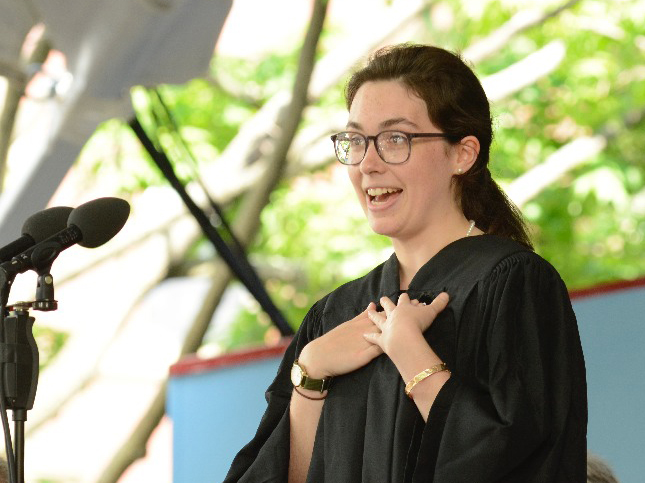
Anne Ames Power
Photograph by Stu Rosner
Power, who grew up on the Upper West Side of Manhattan, said, “I came to Harvard pretty much knowing that I would concentrate in classics, after studying it since seventh grade. My experiences in the classics department here have been nothing but positive; it’s a real treat to be part of a small concentration but with a large and talented faculty.” She also studied history of art and architecture as a secondary field, and participated in the Gilbert and Sullivan Players.
Concentrating in classics of course provides a huge edge in competing for and delivering the Latin Salutatory—not least because Pope professor of the Latin language and literature is the speech coach for the occasion. Offsetting that advantage somewhat, Power had to navigate Memorial Church’s steps in a walking cast: she stumbled off a curb and fractured a metatarsal in her right foot earlier in the month.
After Power’s foot heals, her happy academic trajectory remains intact: her salutatory delivered, she intends to summer in New York City before traveling to Ireland in the fall, where she will pursue her master’s in classics at Trinity College Dublin.
Power riffed amusingly on “a language that nobody actually understands”—not so much Latin as the quirky argot of Harvard (read her text here), with emphasis on both the priority of Harvard and the obligations of soon-to-be alumni:
Hic non est libellus sicut ille Catulli, qui arida modo pumice expolitus fuit. Immo vero est quaedam tabula mentis quae multa nomina verbaque et ioca arcana continet. Etiamsi haec tabula nihil aliis significat, tamen nobis est sicut testimonium saeclorum nostrorum apud hanc Universitatem.
(This is not a little book like Catullus’s, “newly polished with dry pumice.” Rather, it is a mental catalogue of names, phrases, and inside jokes that might mean nothing to others but for us stand as testament of our time as Harvard students.)
Among the entries in her dictionary, “from the minute we stepped on campus”:
As we navigated squalid roommates, terrifying professors, and the twisting streets of Cambridge, we also had to contend with the ambiguous meaning of specialized phrases. Am I late, or am I on “Harvard Time?” What’s a “final club”? Is that like a study group? But as with any language, the best way to learn it is by speaking it. Thus, by December, we could discourse on the merits of General Education, the brilliance of Pinocchio’s, and those tourists who stand between you and Starbucks.
Our first year behind us, we sallied forth, our dictionaries replete with phrases and concepts zealously collected. We knew that there was only one River, only one Yard, and only one Game, and thus they needed no qualifiers. We also knew that some entries could have double meanings. For example, at Harvard a “concentration” can be defined as “an individual course of study” as well as “what you lack in Friday morning class.”
As upperclassmen, she and her classmates grew to appreciate the more sophisticated nuances of Lingua Harvardiana, as in the senior-year insight “that ‘thesis’ can be a noun, a verb, and a state of being.”
They would do well to remember their mastery of this new jargon, Power counseled, for now “the real world calls with a language that is scarily real” and it has come time to master yet another vocabulary: “horrible words like ‘rent,’ ‘job,’ and ‘networking.’ ‘Oh Jupiter,’ you want to cry, ‘why is there no “shopping week” for life?’”
“Sorry, Not Sorry”: Senior English Address
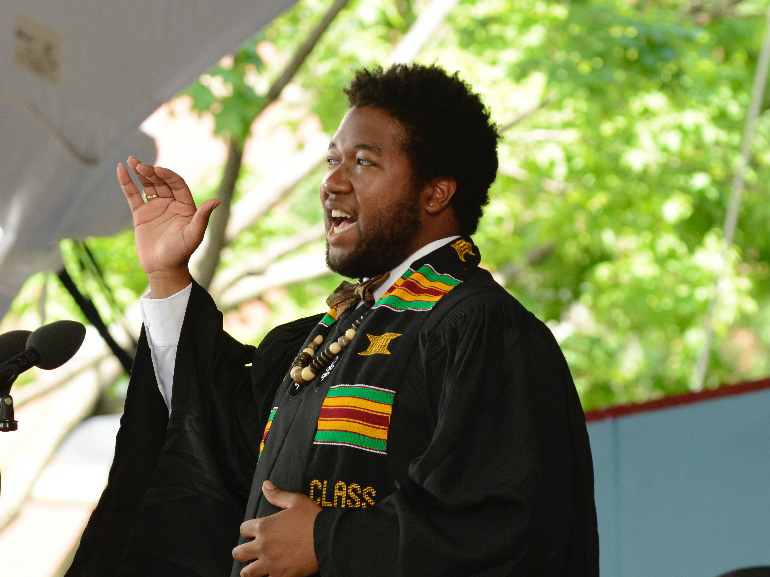
Joshuah Brian Campbell
Photography by Stu Rosner
Campbell (profiled by the Gazette here) said he grew up in rural Cheraw, South Carolina, singing in his church choir. That early experience carried through Cambridge and the College: he said, “I spent most of my time singing and then doing theatre. I sang with the Kroks, Harvard VoxJazz, Kuumba, [and] the University Choir.” Academically, he “studied Romance languages and literatures (French and Francophone studies) and music with a secondary in ethnicity, migration, and rights.” Those combined interests melded in “a senior thesis recital/project” titled “‘Paris Tout Entier’: Musical Histories of Improvisation and Blackness from African-American Musicians in Paris, 1920 to Now” (for which he was awarded a Hoopes Prize, the recognition for outstanding scholarship or research demonstrated by seniors’ capstone theses or other projects).
The tireless Campbell also “acted with and served on board of the Harvard Black Community and Student Theater group (BlackC.A.S.T.), and I was in the Hasty Pudding Theatricals. I did a few other shows as well. I’ve tried to make it my goal as an artist to enter spaces and to diversify them with my own presence, and thereby open the door for other marginalized people. I was truly honored to sing a song I devised at a protest/solidarity rally last fall for the students at Yale, Mizzou, etc..” Despite all that on-stage experience, he confessed to a tiny bit of nervousness before performing on this Big Day. (And he had another high-profile Commencement obligation, too; see below, on the honorary degrees.)
Campbell intends to be in Paris, and elsewhere in Europe, this summer, listening to (“but maybe also making”) music. Come fall, he plans to relocate to New York City, just as Power vacates it, and to pursue work “singing/acting/maybe teaching a little, too.”
His address (read the text), the prose equivalent of an intricate musical composition, weaving multiple themes together touched on identity, authenticity, and diversity, before ending, in a fresh way, on traditional graduation themes. He began, harrowingly, by talking about the guilty feelings that stemmed from hitting his elder brother with a Wiffle-ball bat, triggering the growth of a latent cancer—and then discovering that that was a blessing in disguise, because it led to a timely cure. As he reflected on apologizing, Campbell realized:
I have learned new ways to be “sorry,” new ways to worry that I might be making mistakes. I disguise the truest version of myself behind apology after apology—I’m sorry for being annoying, I’m sorry for taking up too much space, I’m sorry if this speech is boring you. We all do it. Here at Harvard, where everyone seems to be a straight-A, type-A student, I believe our biggest struggle often becomes finding ways to feel inadequate. So unused to being among people who are—in all their differences—still so similar to ourselves, we constantly play the game of throwing ourselves into relief of one another. We assume a need to be apologetic up front to save ourselves from vulnerability. Incessantly teasing out our strengths and weaknesses, we forget that we are whole people, with complexities that interact mellifluously like lines of musical counterpoint.
He continued, altering serious reflection with humor the seniors especially could appreciate:
I have a fear. I fear that I don’t know how to live life authentically because I’ve spent so much time trying to be a perfect version of myself. I won’t say that it was time wasted; that drive for perfection helped me grow as a musician, and it also helped me turn in something that looks like a thesis. But I will say that now, looking out inspired by your presence here today, it’s high time I learned how to live without apology. Being authentic requires it; it means not apologizing for the imperfections, because those imperfections make up our beautiful differences.
Looking inward, he found:
I struggle with the conundrum of how to be my true self when a big part of my life is framed by performance. I struggle more with the ways I must perform as a person of color in a too-often hostile world. But I have discovered that the relationship between performing and living authentically can be a helpful space of self-exploration. In fact, the two are not so different for me. I have begun to feel the most like myself on stage. When the lights go up, I feel the need to apologize fly away. Why is it so hard to find this strength in every day life? What is this force that keeps human beings—creative and adaptive beings—moving and living?
Following a shout-out to his academic adviser and “my academic mom,” Alice Jardine, professor of Romance languages and literatures and chair of the committee on degrees in studies of women, gender, and sexuality, Campbell segued from his own unapologetic identity as performer to a larger lesson in living:
We have to take ourselves less seriously and our beneficial relationship to the world around us more seriously. We have something to give to this world, something that being a cookie-cutter human being can’t give it. In turn the world has many things store to offer us; gifts and opportunities that we cannot accept if we are preoccupied with perfection and not with play. When we play, we learn how being vulnerable can lead to meaningful collaboration. When we play, we reach upward and outward, hands open to receive both life’s pleasures and its necessary pains.
“The Spider’s Bite”: Graduate English Address
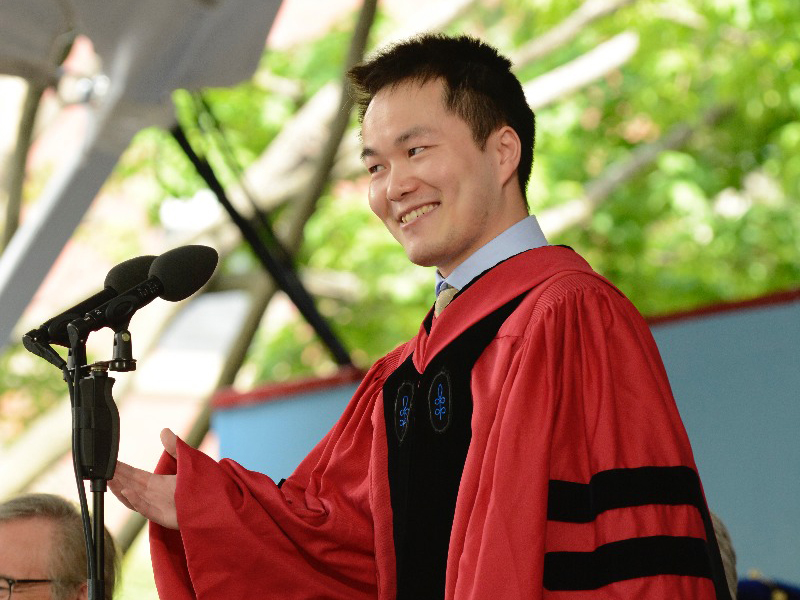
He Jiang
Photograph by Stu Rosner
He Jiang began his address with a childhood medical memory, too, but from the perspective of central southeastern China, in circumstances far different from Campbell’s southeastern United States—and of course in a different language tradition.
“I grew up in Hunan province,” he noted in an exchange before Commencement week—not in “the modern China many people may know.” His poor farming family “didn’t have much modern technology when I was growing up. Electricity was not introduced in my village till the 1990s and we didn't have our first telephone till 2001. For our daily life, we used oil lamps…and built wells for our drinking water. Educational resources were also limited there. Our teachers were not so well trained as compared to those in the cities. Except for textbooks, we had no other good channels to get books to read. I remember students treasured the books so much that they'd wrap their book cover with a plastic seal to protect it from getting damaged from reading.”
Harvard was not even on his horizon, he continued. “In fact, the first time I got out from my village to a city was in 2005 when I entered college. I was very naive about living an urban life at that time. I didn’t know how to use a computer, for example.” He studied at the University of Science and Technology, in Hefei, Anhui province, where every freshman was required to take a computer-programming class: “a memorable and tough experience for me, definitely.”
He Jiang has now received his Ph.D. in biochemistry. He worked in the laboratory of Xiaowei Zhuang, Arnold professor of science; there, he pursued developing single-molecule imaging techniques and applying them, with other techniques, to elucidate molecular mechanisms of several host factors for flu-virus infection, among other inquiries. After Commencement, he moves downriver to begin work as a postdoctoral fellow at MIT’s Koch Institute for Integrative Cancer Research, where he will study malaria and hepatitis virus infection, and ultrasensitive early cancer diagnostics.
His background and status as a Harvard Commencement speaker have made him a social-media phenomenon in China. In his address (read the text), He said, he hoped to bridge some of the distance between his poor, rural upbringing and the world of the advanced research university that he now occupies—applying frontier science to such elemental plagues as the flu, malaria, and hepatitis, thereby highlighting “how knowledge and technology are unequally distributed in different parts of the world.” His opening story dramatizes “how people in the underdeveloped regions deal with their daily crisis.” Drawing on the education and training he has been able to attain, He said, “I feel that we could easily help so many people in the underdeveloped world by sharing and communicating the knowledge we have in the modern world….At the same time, I also hope I could help bring the voices of people from that remote world to the outside, and let Harvard graduates rethink our mission as we start our next voyage.”
His talk began this way:
When I was in middle school, a poisonous spider bit my right hand. I ran to my mom for help—but instead of taking me to a doctor, my mom set my hand on fire.
After wrapping my hand with cotton, then soaking it in wine, and putting a chopstick into my mouth, she ignited the cotton. The flame quickly engulfed my hand. The searing pain made me want to scream, but the chopstick prevented it. All I could do was watch my hand burn—one minute, two minutes—until mom put out the fire.
You see, the part of China I grew up in was a poor, pre-industrial farming society. When I was born, my village had no cars, no telephones, no electricity, not even running water. And we certainly didn’t have modern medical resources. There was no doctor to see about my spider bite.
For those who study biology, you may have grasped the science behind my mom’s cure: heat deactivates protein, and the spider’s venom is simply a form of protein. It’s cool how that folk remedy incorporates basic biochemistry, isn’t it? But I am a Ph.D. student in biochemistry at Harvard, I know that better, less painful treatment existed. So I can’t help but ask myself, why I didn’t receive one at the time?
Having mastered many of biology’s insights (“We have learned to edit the human genome and unlock many secrets of cancer. We can control neuronal activity with the switch of a light. Each year brings more advances in biomedical research—exciting, transformative accomplishments”), He now is “troubled by the unequal distribution” of that knowledge. “[D]espite the knowledge we have amassed, we haven’t been as successful in deploying it where it’s needed most.…All over the world, poverty, illness, and lack of resources impede the flow of scientific information. In far too many places, people are still essentially trying to cure a spider bite with fire.”
Reflecting on simple techniques for coping with bird flu, He saw the power of applying knowledge where it is needed. Most important, “it was also a vital inflection point in my own ethical development, my own self-understanding as a member of the global community.”
As the newly degreed set off to pursue their dreams of “grand destinations and big adventures” He is “thinking of the farmers in my village. My experience reminds me how important it is for researchers to communicate our knowledge to those who need it. Because using the science we already have, we could probably bring my village and thousands like it into the world you and I take for granted every day. And that’s an impact every one of us can make!”
Beaming at the end of his remarks, he said both “thank you” and “xiè xiè.”
The Choir then sang “Simple Gifts,” beautifully arranged by Josh Bean ’16.
To the Degrees
Students, the Gazette reported, were to be rewarded for their past diligence by earning 7,727 degrees and 11 certificates; undergraduates in Harvard College earned 1,661 of those degrees.
The presentation of these candidates eager for their degrees featured some new players this year, and a departing one. Engineering and applied sciences dean Francis J. Doyle III took up his responsibilities last August; his Commencement debut took place on a day that may have made his relocation from the University of California, Santa Barbara, seem painless. Doing the duties for the public-health graduates was Gregory professor in cancer prevention and dean for academic affairs David Hunter, who has served as acting dean since last August; Michelle A. Williams, a professor at the school—and the first African American to become leader of one of Harvard’s faculties—takes over in July. Also new in his cap-doffing role was the Kennedy School’s Douglas W. Elmendorf, who became dean last January—and who conveniently comes to his new Commencement responsibilities already equipped with his Harvard doctoral gown (Ph.D. '89). And bowing to “Madam President and Fellows of Harvard College…” for the last time was Harvard Medical School dean Jeffrey S. Flier, who bows out July 31. When he rose, Provost Alan Garber thanked him for his long service.
Perhaps it was the sheer loveliness of the day (which didn't begin to feel damply hot until late in the morning), but the students and their deans were uncommonly frisky, interrupting the normally crisp order of conferring degrees repeatedly. The merriment began when Xiao-Li Meng, beginning to present the doctoral candidates, said, “As dean of the Graduate School of Arts and Sciences…,” paused, and then continued, “hearing no cheering,” finally elicited the wanted response—but not loud enough to satisfy—and cued another round. He thanked Joshuah Campbell for giving him the confidence to depart from the script without apologizing to President Faust. The president, attempting to confer said doctoral degrees, was in turn interrupted, and had to command the rowdy scholars to “wait a minute, here comes the responsibility part. You can't leave that out.”
There were further miscues, with School of Dental Medicine dean R. Bruce Donoff approaching the microphone and freezing as Garber paused, and various times when students were supposed to rise, but did not, or upon being commanded to rise, were deemed to have risen already. Harvard Divinity School dean David N. Hempton ad libbed about being leader of “the huge faculty of divinity.” (Size aside, the school has longevity: it celebrates its bicentennial this coming academic year.) Graduate School of Education dean James Ryan, stopped mid introduction by the future teachers’ cheers, said, “I'm gonna forget my lines.” He didn’t, of course. All in good fun.
Compared to their graduate and professional school predecessors, the undergraduates were downright orderly, reversing the normal order of affairs. People were fanning themselves, so perhaps the temperature, by then in the low 80s, was getting to them.
The Honorands
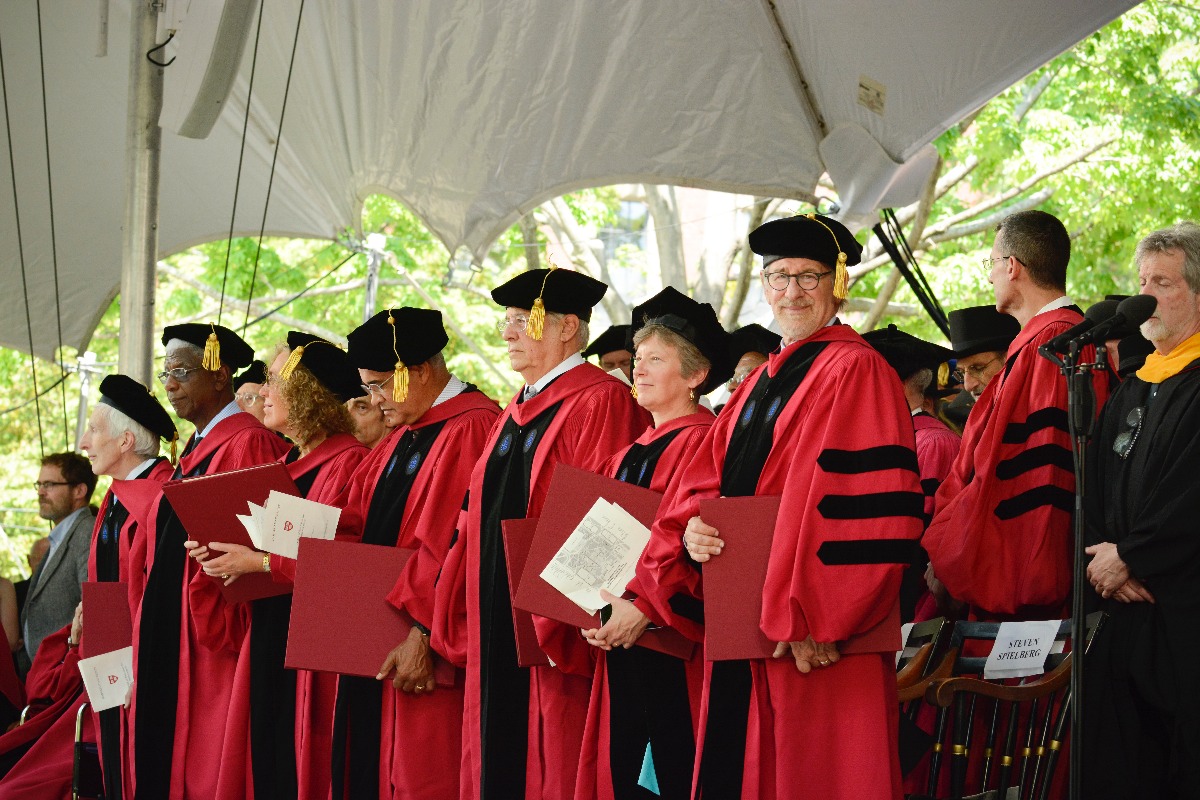
Photograph by Stu Rosner
The nine honorary-degree recipients (read in-depth biographies here) span from western Africa to eastern South America; work on subjects as small as epidermal skin cells and as vast as the cosmos; and pursue the philosophy of ethics and the law of equal rights. In a year when campuses nationwide, including this one, struggled with issues of racial equity, two of the honorands have probed slavery, abolition, and the African-American experience in American arts and life.
At the event celebrating their contributions, held Wednesday night in Annenberg Hall, the indefatigable Joshuah Campbell more or less sang for his dinner. The musical interlude that occurs during President Faust’s presentation of the honorands was Antônio Carlos Jobim’s “Desafinado” (“offkey” or “tuneless”)—a Brazilian work, chosen as a treat for His Excellency Fernando Enrique Cardoso. Campbell sang, accompanied on guitar by Alex Graff ’17.
The degrees were conferred in the following order on:
- Judith J. Thomson, Doctor of Laws
- David B. Davis, Doctor of Laws
- The Right Honourable Lord Martin Rees of Ludlow, Doctor of Science (whose cosmological research, Garber joked, without meaning to disrespect anyone else on the platform, had played to the human desire to “understand the extraterrestrial”)
- El Anatsui, Doctor of Arts
- Elaine Fuchs, Doctor of Science (a “doyenne of the epidermis,” according to her citation)
- Arnold Rampersad, Doctor of Laws (an expositor of “the matter of Black lives,” per his citation)
- His Excellency Fernando Henrique Cardoso, Doctor of Laws
- Mary L. Bonauto, Doctor of Laws
- Steven Spielberg, Doctor of Arts (during whose list of accomplishments read by Garber the band piped in with snippets of theme songs from the hit movies; the provost called him “a cinematic man of letters—E.T., A.I., and B.F.G. to name just a few”)
And a Special “Graduate”
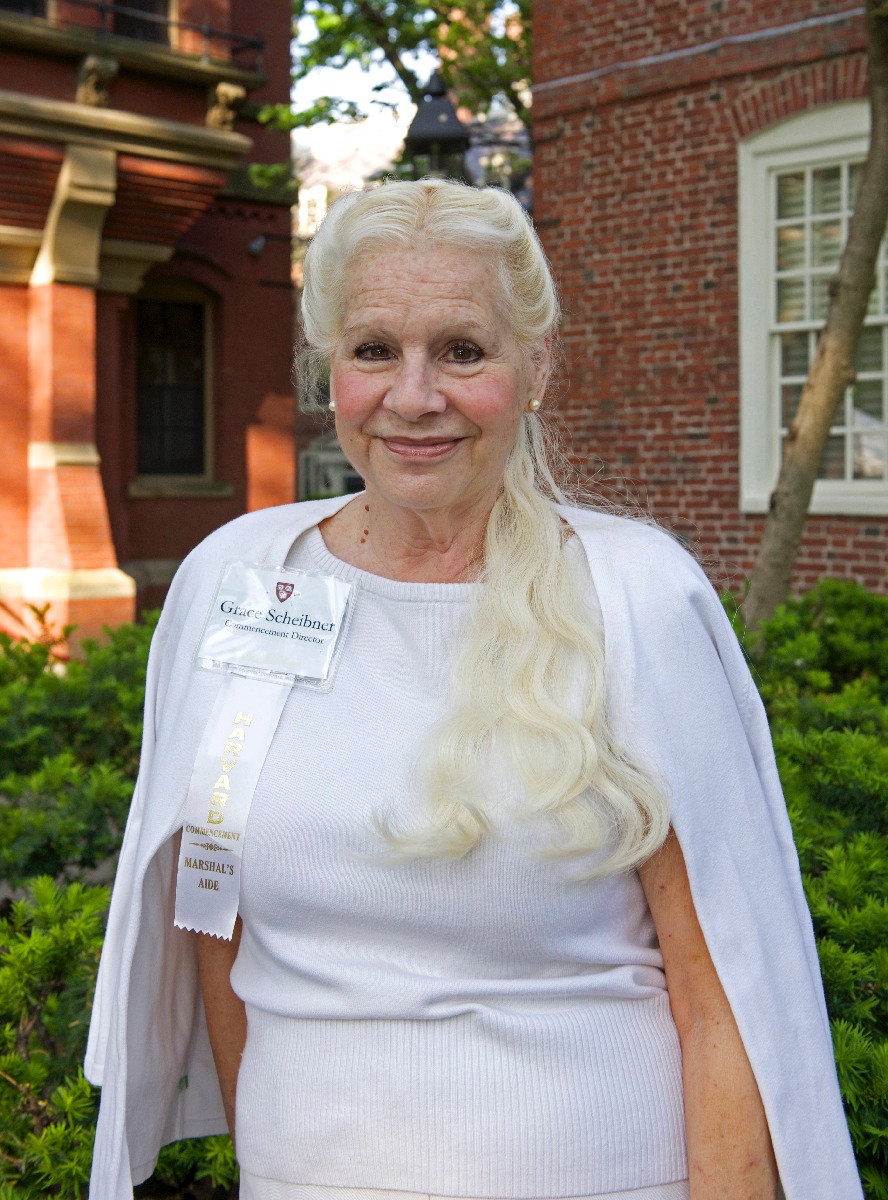
Photograph by Jim Harrison
Among the honored “graduates,” in a different sense, is Grace Scheibner, to whom Faust then offered a congratulatory shout-out, noting her many years of putting on the festival rites for the University. Scheibner is Harvard’s first formal Commencement director, for whom these 365th exercises were the twenty-fourth and last: she announced this spring that she planned to retire after this year. (NYU’s commencement director, Gregory Albanis, also retiring this spring, and covered at great length in The New York Times, seems almost a rookie by comparison—although Scheibner would resonate to his stash of 32,000 ponchos, just in case.)
It may have occurred to some members of the day’s crowd that a lot of work is involved in coordinating the delivery of tents, installation of signage, arraying of fields of chairs, hanging of banners, wiring of lights and cameras and sound systems, doling out of tons of food and beverages, and all the other logistics that go into making Harvard’s supersized graduation-cum-reunions somehow come together. The work truly takes a village: the University’s job posting for the position (39357BR, for any as-yet unemployed graduates) mentions “manag[ing] the configuration and ticketing of the outdoor space,” “creat[ing] detailed instructions and conduct[ing] multiple briefings and trainings,” serving as security liaison, providing direction to technical, maintenance, and operations crews, running the budget and negotiating contracts, overseeing all the printed materials, and so on.
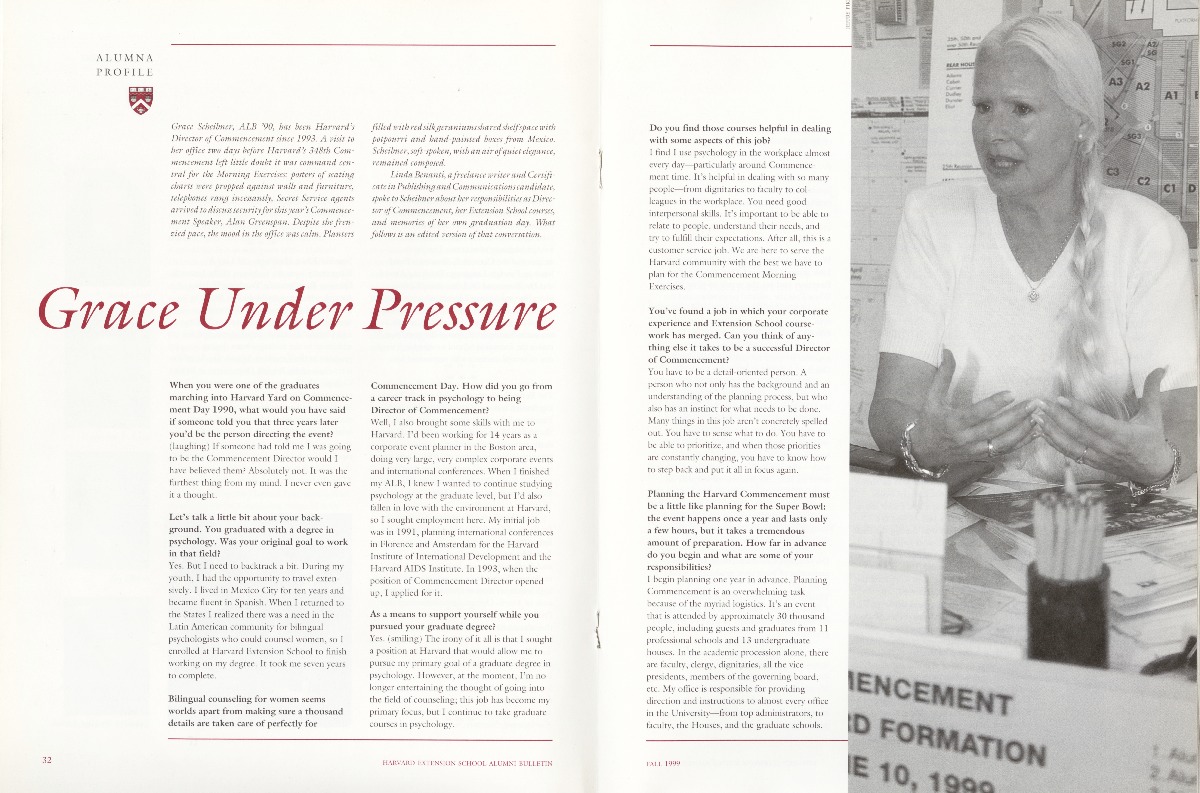
Fair enough—but what it omits are the deep reserves of psychological insight and diplomatic skill needed to pull all that off, while fending off (or accommodating) requests for tickets, making honorands (heads of state, temperamental artists, and so on) utterly comfortable, etc. Scheibner has both: formally—her Harvard A.L.B. ’90 and subsequent course work for her master’s degree in psychology; and informally—her life experiences with and disposition toward people in every walk of life, around the world. She has always been fiercely focused on making Commencement a great occasion for students, families, reunioners, and guests—no less this year than in her previous 23. Harvard, and Harvard Commencements, will go on, but, after Scheibner’s own graduation, differently.
Faust’s recognition for Scheibner’s Commencement service appropriately made, University marshal Jackie O’Neill then invited guests to the afternoon exercises, setting up the Harvard Hymn and benediction. The last, delivered by the Pusey Minister in the Memorial Church and Plummer professor of Christian morals Jonathan L. Walton, was itself a surprise: the first in memory written in verse, and certainly the first ever delivered in a rap rhythm—an admonition to the graduates that “Time is fleeting and it is filled with swift transition,” so they should make use of all of it, for “It is God's minute.”
[Updated May 27, 8:30 a.m., to provide the verse, courtesy of Walton. As he notes, it was often cited by the late educator Benjamin Elijah Mays, but the exact authorship is uncertain:
We have only but a minute.Just sixty seconds in it.Forced upon us, can't refuse it,Didn't seek it, did not choose it.But it's up to us to use it.We will suffer if we lose it.We must give an account if we abuse it.For its only just a minute,but there is an eternity within it.]
Then, as someone shouted, “It's so hot!” (to assenting laughter), the Sheriff of Middlesex County made use of his last minute, adding to the hot air and shattering ears (as is his wont), and perhaps threatening the structural integrity of the now-peeling bells, as he adjourned the proceedings at 11:33 a.m.
